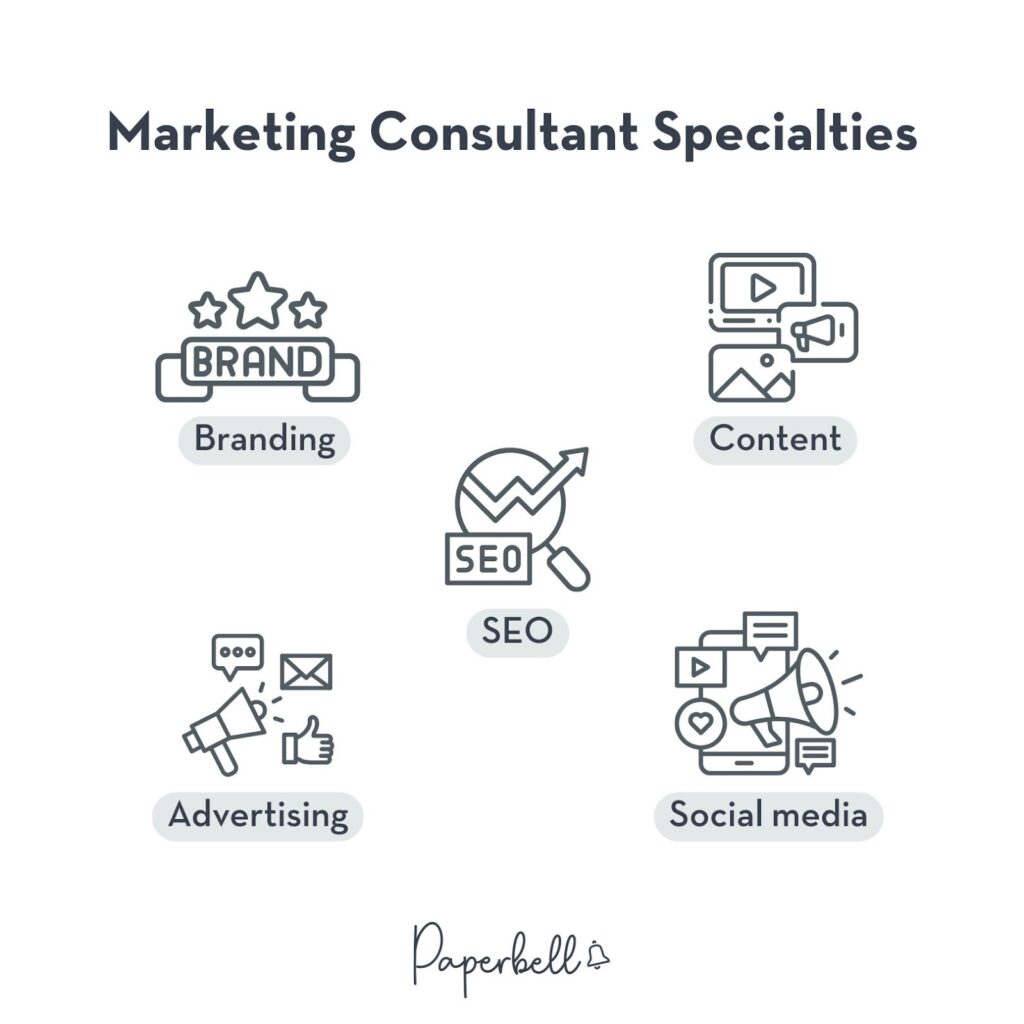Many professionals and coaches consider expanding their services to consulting to offer more hands-on guidance or strategic support.
In this quick guide, we’ll break down:
- What is a consultant?
- What do they do?
- How do they differ from coaches?
- Who do they work for?
What Is a Consultant?
The job title ‘consultant’ comes with many hats but essentially, it’s a person with a specific skill set or experience who provides advice in a specific specialization.
Unlike a coach, a consultant will tell their clients exactly what they need to do to solve the problem at hand. Where coaches help their clients build their capacity to solve a problem, a consultant gets paid to fix that problem directly.
💡 Whether you run a coaching or consulting practice, Paperbell helps you run it with ease. It’s an all-in-one website and client management tool that handles scheduling, payments, contracts, and more.
What Does a Consultant Do?
In short, professional consultants provide expert advice to help clients solve specific problems or improve certain areas of their businesses. But what that looks like depends entirely on their area of expertise.
Let’s take a look at a few common niches in the consulting industry and their focus.
[ Read: 34 Types of Consulting Services to Offer Clients ]
1. Management Consultants
Management consulting is about helping organizations improve their overall performance, structure, and operations. It’s often brought in to solve internal problems, optimize processes, or guide large-scale changes like mergers, restructuring, or adopting new tech.
While management consulting typically focuses on diagnosing issues and recommending solutions, sometimes it’s also about overseeing project management, implementation, and supporting internal teams through transitions.
2. Financial Consultants
Financial consultants help individuals or businesses make informed decisions about money. They might assist with:
- Budgeting
- Investment planning
- Retirement strategies
- Financial forecasting
In a business setting, they often analyze financial data to identify risks, improve profitability, or guide big financial decisions like acquisitions or expansions.
Their goal is to bring clarity and structure to financial matters so clients can move forward with confidence.
3. Sales Consultants
Consultants in this niche aren’t just salespeople but vital advisors that help businesses of all sizes become and stay profitable.
They can analyze the client’s funnel system and sales infrastructure to help them generate maximum ROI. They may also train the team on the skills needed to bring in those numbers, like persuasive communication or CRM management.
4. Leasing Consultants
Leasing consultants offer professional services for property owners to find tenants for rental units. They handle everything from showing apartments to screening tenants and managing lease agreements.
Unlike realtors, who usually focus on buying and selling homes, leasing consultants specialize in rentals and typically work directly for property management companies rather than on commission.
5. Marketing Consultants

Marketing consultants help businesses attract and retain customers by improving their marketing strategy. Depending on their expertise, they might specialize in:
- Branding
- Content
- Advertising
- SEO
- Social media
While some focus purely on strategy and planning, others are more hands-on, overseeing campaigns, working with creative teams, or even managing certain marketing channels directly. The level of execution they take on usually depends on the client’s needs and the consulting services offered.
6. Strategy Consultants
Strategy consulting firms specialize in high-level planning and decision-making. They work with leadership teams to:
- Identify growth opportunities
- Assess risks
- Develop long-term plans for the business
Their work often includes market analysis, competitive positioning, and setting priorities across departments.
Unlike management consulting, strategy consulting usually stays at the planning level.
7. Technology Consultants
Technology consultants help businesses improve their tech infrastructure, whether that means implementing new software, optimizing existing systems, or solving IT challenges.
They often act as the bridge between leadership and tech teams. Their aim is that digital tools in the organization support company goals instead of creating more complexity or friction.
8. HR Consultants
HR consultants support organizations with everything related to human resources:
- Hiring
- Onboarding
- Compliance
- Benefits
- Culture
They can give feedback on job descriptions, streamline interview processes, or improve retention strategies. Whether the goal is to grow the team or restructure it, they can make those transitions smoother and more effective.
9. Tax Consultants
A tax consulting firm or professional helps individuals or businesses understand and manage their tax obligations. They offer strategic advice to minimize liabilities, maintain compliance with local regulations, and prepare for audits or filings.
Some also provide consulting services for ongoing financial planning support, especially for those with complex income streams (like inheritance or charitable giving) or shifting financial goals.
10. Brand Consultants
Brand consultants help businesses define what they stand for and how they show up. This can involve refining a brand’s visual identity, tone of voice, and messaging, or repositioning it entirely.
Their goal is to help businesses connect with the right audience in a way that feels clear, consistent, and memorable.
11. Travel Consultants
Travel consultants plan complex itineraries for individuals or businesses, saving them time, money, and hassle. They book flights, hotels, and activities while also offering insider recommendations and backup plans.
Corporate travel consultants may also manage ongoing logistics for executives or entire teams, often securing better rates and perks.
12. Security Consultants
Security consultants assess and improve the safety of physical environments, like office buildings, events, or residential properties.
They create risk management plans, recommend surveillance systems, and train staff in safety protocols. Their expertise helps prevent theft, loss, or harm and ensures the business is prepared to respond when needed.
13. Cybersecurity Consultants
Cybersecurity firms and consultants, on the other hand, help businesses stay one step ahead of hackers. They look for system vulnerabilities, patch them up, and put safeguards in place to keep sensitive data safe. Some focus on things like ransomware or identity theft, and many also train teams to spot suspicious activity before it becomes a big problem. They may also educate clients about emerging threats such as sim swapping, where attackers take over a phone number to break into personal or business accounts.
14. Small Business Consultants
Small business consultants work closely with founders to make their businesses more sustainable, profitable, and aligned with their goals, whether that means growing, simplifying, or just getting out of daily firefighting mode.
They adapt to the (often resource-stretched) reality of the client’s business, switching between strategic advising and hands-on problem-solving across everything from pricing to operations.
15. PR Consultants
PR consultants shape how a business presents itself to the public. They help craft a compelling narrative, land media coverage, prep founders for interviews, and manage crises when needed.
Their work isn’t just about attention but building long-term credibility and keeping the company’s reputation aligned with its values.
16. Sustainability Consultants
Sustainability consultants help businesses reduce their environmental footprint while staying compliant and competitive. Depending on the industry, that might mean:
- Rethinking packaging
- Reducing emissions
- Building an ESG strategy from scratch
They bring a mix of practicality and purpose, often bridging the gap between brand values and real-world action.
17. Legal Consultants
Legal consultants give businesses access to expert legal advice without the full-time overhead. They might review contracts, flag compliance issues, or guide intellectual property decisions.
Especially for startups or growing businesses, they offer just-in-time support to avoid costly missteps and operate with confidence.
18. Client Relationship Consultants
Client experience consultants focus on what happens after the sale, which can make or break the success of a business.
They map out the customer journey, help create a smoother client experience, and implement customer feedback. Their aim is to help companies provide standout service and word-of-mouth growth.
19. AI Consultants
AI consultants help businesses leverage artificial intelligence in practical, results-driven ways, whether that means:
- Automating operations
- Improving decision-making with predictive models
- Integrating tools like ChatGPT into workflows
They make complex tech accessible and aligned with the company’s goals, not just a shiny object.
20. DEI Consultants
DEI (Diversity, Equity, and Inclusion) consultants help organizations build fairer, more inclusive workplaces. They audit policies, identify biases, and create strategies for more equitable hiring, pay, and culture.
Beyond training, their job is to embed inclusion into the company’s systems, so diversity becomes part of the DNA of the business.
Consultants vs. Coaches: What’s the Difference?
While both consultants and coaches help businesses or individuals improve, they typically have different approaches.
Consultants provide expert advice and strategies based on their specialized knowledge to solve specific problems, often taking a hands-on role in implementation.
Coaches, on the other hand, focus on guiding clients through self-discovery and helping them develop their own solutions. They tend to work more on personal development, while consultants tackle business challenges with actionable recommendations.
Some professionals combine both roles, serving as coaching consultants. They balance these two approaches by clearly defining when they’re offering advice and solutions (consulting) versus when they’re helping clients explore their own ideas and decisions (coaching).
Who Do Consultants Work For?
Consultants work for a variety of clients depending on their specialties. Most consultants work for businesses big and small, but independent consultants who specialize in financials or travel can also help individuals who don’t have a business, too.
Within a business, consultants will work with people at different levels. For example, marketing consultants may work with the marketing department, but they may also work directly with executives or business owners if the business is smaller.
Why Do Companies Hire Consultants?
External consultants have specialized skills and expertise that can be difficult to find in in-house staff. They can provide a refreshing outside perspective and bring in industry best practices, which is less common with internal consultants who only work with a single company.
Companies often hire consultants to tackle specific challenges they have solved for others or implement complex changes. Whether it’s for short-term projects or long-term collaborations, consultants offer businesses the flexibility to access high-level knowledge without the commitment of hiring full-time employees.
They can quickly assess a situation, implement new solutions, and deliver results to drive growth and innovation.
How to Become a Consultant
Becoming a consultant starts with building expertise in a particular niche. You need to build a strong foundation either through professional experience, like leadership roles, specialized training, or both.
Depending on your specialization, you can explore options at organizations like the Project Management Institute or the Human Resource Certification Institute (HRCI).
Once you’re confident in your abilities, define what you offer and who your ideal clients are in your consulting packages. Consider the specific problems you can solve and the audience who will benefit most from your expertise.
To find your first few clients, leverage your local or online network and offer initial free consultations to gain practical experience and feedback. As you build your client portfolio, refine your approach and pricing, and establish an online presence that positions you as an expert.
FAQ
What Is a Consultant in Business?
A business consultant provides expert advice to organizations, helping solve problems, improve performance, and implement solutions. They specialize in areas like strategy or management consulting.
How Much Does a Consultant Make? What Is a Consultant’s Salary?
Consulting salaries vary widely depending on niche, experience, and location. On average, business consultants can make anywhere from $50,000 to $200,000 per year, with high-end consultants in specialized fields earning even more.
Do Consultants Need Certifications?
While not mandatory, certifications can boost a consultant’s credibility and expertise. Fields like project management, HR, and IT offer certifications that can enhance your qualifications and help attract clients, but practical experience is often equally valuable.
How Do Consultants Find Clients?
Consultants often find clients through networking, referrals, and using online platforms like LinkedIn or industry-specific websites. Offering free consultations or thought leadership through blogs or webinars can also help attract potential clients.
How Can I Use Paperbell for My Consulting Business?
Paperbell simplifies client organization by handling your website, bookings, payments, contracts, and client communication. It automates your workflow so you can focus on delivering results.
Ready to Start a Professional Consultancy?
Running a business takes more than just meeting clients. You need to build an online presence for your consultancy services and manage clients in an organized way, which can take up a lot of time.
Paperbell handles your consulting website, bookings, payments, contracts, surveys, and more, freeing up time for new cases in your roster. Try it free with your first client and see how it can streamline your business.

Editor’s Note: This post was originally published in March 2022 and has since been updated for accuracy.









